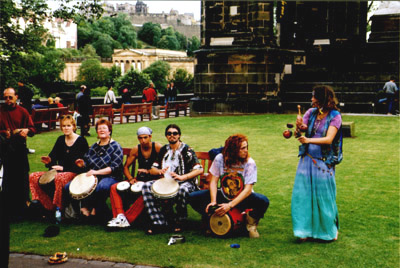Arts festival
Arts Festival
An Arts Festival is a community event focused on the celebration and showcasing of various forms of art, including visual arts, music, dance, theatre, and more. These festivals provide a platform for artists to display their work, engage with the public, and often sell their creations. Arts festivals can range from small, local gatherings to large, international events, attracting thousands of visitors and featuring a diverse array of performances, exhibitions, and workshops.
History[edit | edit source]
The tradition of arts festivals dates back centuries, with roots in ancient Greek and Roman celebrations. These early festivals were often tied to religious or seasonal events, incorporating various forms of art to honor gods or celebrate harvests. In the modern era, arts festivals have evolved to become more inclusive and diverse, reflecting the broad spectrum of human creativity and cultural expression.
Types of Arts Festivals[edit | edit source]
Arts festivals can be categorized by their primary focus, such as:
- Music Festivals: Concentrating on musical performances across genres.
- Film Festivals: Showcasing cinematic works, from short films to feature-length movies.
- Literature Festivals: Focusing on the written word, including readings, author discussions, and book signings.
- Theatre Festivals: Highlighting live theatre performances, from traditional plays to experimental theatre.
- Visual Arts Festivals: Exhibiting works of art, including paintings, sculptures, and installations.
Significance[edit | edit source]
Arts festivals play a crucial role in the cultural and economic life of communities. They provide artists with a vital platform to reach new audiences, foster artistic collaboration, and stimulate creativity. For attendees, these festivals offer unique opportunities to experience art in a communal setting, promoting cultural appreciation and understanding. Economically, arts festivals can significantly impact local economies by attracting tourists, creating jobs, and supporting local businesses.
Challenges[edit | edit source]
Organizing an arts festival presents various challenges, including securing funding, managing logistics, and curating content. Ensuring accessibility and inclusivity also remains a critical concern, as festivals strive to represent diverse voices and reach broader audiences.
Notable Arts Festivals[edit | edit source]
Some of the world's most renowned arts festivals include:
- Edinburgh Festival Fringe (Scotland) - The world's largest arts festival, featuring thousands of performers in a variety of venues.
- Venice Biennale (Italy) - A prestigious event focusing on contemporary visual art.
- South by Southwest (SXSW) (USA) - An annual conglomeration of film, interactive media, and music festivals.
- Montreux Jazz Festival (Switzerland) - One of the most prestigious jazz festivals in the world.
Future Trends[edit | edit source]
The future of arts festivals is likely to see increased use of digital technology, both in the presentation of art and in the management of festival logistics. Virtual reality, live streaming, and social media are becoming integral parts of the festival experience, enabling wider access and engagement. Sustainability and environmental responsibility are also becoming key considerations in festival planning.
Navigation: Wellness - Encyclopedia - Health topics - Disease Index - Drugs - World Directory - Gray's Anatomy - Keto diet - Recipes
Search WikiMD
Ad.Tired of being Overweight? Try W8MD's physician weight loss program.
Semaglutide (Ozempic / Wegovy and Tirzepatide (Mounjaro / Zepbound) available.
Advertise on WikiMD
WikiMD is not a substitute for professional medical advice. See full disclaimer.
Credits:Most images are courtesy of Wikimedia commons, and templates Wikipedia, licensed under CC BY SA or similar.Contributors: Prab R. Tumpati, MD

